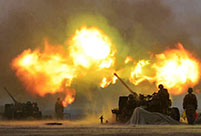 Top 100 beauties in the world!
Top 100 beauties in the world!
 Gallery: Who is the most beautiful one?
Gallery: Who is the most beautiful one?
 If you like autumn, put your hands in the air!
If you like autumn, put your hands in the air!
 Fan Bingbing's "Queen style" in new play
Fan Bingbing's "Queen style" in new play
 Lingerie show at 2014 Miss China
Lingerie show at 2014 Miss China
 J-10 fighters show aerobatic stunts in smog-free sky
J-10 fighters show aerobatic stunts in smog-free sky
 Charming contestants of Shanghai Int’l Model Contest
Charming contestants of Shanghai Int’l Model Contest
 Most amazing chi-pao beauties
Most amazing chi-pao beauties
 7 deadly animal attacks
Russia to launch 70 Proton rockets by 2020: official
7 deadly animal attacks
Russia to launch 70 Proton rockets by 2020: officialAfter more than two years of a deepening freeze, relations between Beijing and Tokyo are currently undergoing a thaw. Chinese President Xi Jinping and Japanese Prime Minister Shinzo Abe held an ice-breaking meeting on Monday on the sidelines of the 2014 Asia-Pacific Economic Cooperation conference in Beijing. But one thing that could turn relations back to the ice age is the Yasukuni Shrine.
Abe may have "three arrows" for the economy but his government has shot itself in the foot over the last month or so. Abe took office in December 2012 promising to bring discipline and clarity to Japan's often opaque politics. But these are turbulent times for his administration. Two cabinet ministers resigned in October, others are under fire, a further sales tax hike is proving unpopular and Japan's economic growth forecast has been cut for the fifth straight month.
All this can be turned around, and Abe's fortunes may rebound, but his second spell in office is increasingly reminiscent of his first stint as prime minister in 2006-07 which was marred by scandals among his ministers - several quit and one committed suicide. Abe himself resigned after just one year in the face of parliamentary deadlock, sliding support rates and ill health. His prime ministership, with so many twists and sub-plots, is resembling "Downturn Abe Part Two".
But it is the Yasukuni Shrine that symbolizes a mindset that is not appropriate for the 21st century. His suggestion that his visits to the shrine are a personal matter is as disingenuous as it is dissentious. Every country has the right to remember its fallen but that is not the Yasukuni's role. It is situated just beyond a moat that surrounds the Imperial Palace in Tokyo but no emperor has visited since 1975 when rumors began to surface that the souls of war criminals were going to be enshrined there. In 1978, in a secret ceremony, the souls of all 14 Class-A war criminals were enshrined at Yasukuni. It was not made public until 1979 for fear of a public backlash. Those convicted of Class-B and Class-C war crimes - including "crimes against humanity" - had already been added to the list of "deities".
 World Pole Dance Championship in China
World Pole Dance Championship in China In pics: PLA stages live-fire drill in NE China
In pics: PLA stages live-fire drill in NE China  59-year-old Liu Xiaoqing still looks stunning
59-year-old Liu Xiaoqing still looks stunning  Standard faces for each countries in the world
Standard faces for each countries in the world Shocking! Photos of Chinese fighters revealed
Shocking! Photos of Chinese fighters revealed Images of angels in white: At work v.s off work
Images of angels in white: At work v.s off work  Post-85s female pilots and their mission
Post-85s female pilots and their mission Netizens fall in love with champion swimmer Ning Zetao
Netizens fall in love with champion swimmer Ning Zetao Vibrant 21-year-old and her own Cheongsam brand
Vibrant 21-year-old and her own Cheongsam brand Top 10 most dangerous jobs in the world
Top 10 most dangerous jobs in the world  Top 10 fifth generation jet fighters in the world
Top 10 fifth generation jet fighters in the world Top 10 Chinese goddesses
Top 10 Chinese goddesses  Top 20 hottest women in the world in 2014
Top 20 hottest women in the world in 2014 Top 10 pure beauties in showbiz
Top 10 pure beauties in showbiz  Top 10 world's highest-paid models 2014
Top 10 world's highest-paid models 2014 The most gorgeous Chinese women
The most gorgeous Chinese women Top 10 most handsome faces in Asia
Top 10 most handsome faces in AsiaDay|Week|Month